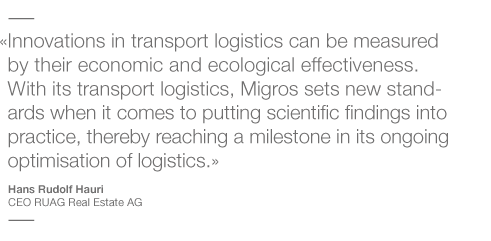
Green mobility pays off
Migros is committed to environmentally-friendly mobility at all levels. In past years, it has focused on intermodal transport in order to send more goods by rail. Customers benefit from enhanced home delivery services.
Migros prefers the efficient methods of rail or sea freight for sending goods. With an annual freight volume exceeding one million tonnes, it is the biggest customer of SBB Cargo in Switzerland. Transport by truck is performed using low-emission vehicles. Migros keeps air transport to a minimum and the CO2 emissions of business flights are offset. Furthermore, the company offers its customers and employees environmentally-friendly forms of transport and mobility, as well as participating in forward-looking mobility projects.
Efficient rail transport
In 2012 the goods wagons of Migros drove a total of approximately 9.9 million kilometres, 2.3% less than in the previous year. In June 2012, for example, the Migros Cooperative Valais increased its rail transport considerably. Due to its revised logistics strategy, the operations centre in Martigny now receives three to five additional rail wagons each day. This avoids 1400 truck journeys a year. Most of the long-distance distribution of Vittel mineral water in Switzerland now also takes place by rail and Migros is handling more transport by intermodal means, both within Switzerland and abroad. For example, a freight train with frozen produce has been running directly from the railway siding of the Neuendorf deep-freeze warehouse to Gossau train station on a regular basis since September 2012. On arrival, the containers are reloaded onto lorries, which then deliver to the stores in Eastern Switzerland. And for the first time, various lorry loads from Italy were transferred onto trains at Gotthard and Lötschberg, demonstrating another example of intermodal transport. Furthermore, Migros started sending test consignments by rail in China – a pioneering achievement. In terms of time, land transport will offer an interesting alternative to sea transport in future, depending on the place of origin.
Chart on rail transport kilometrage
Cooperative Retailing and Industry
Clean road transport
The regional Migros cooperatives and Scana have their own fleet of around 540 vehicles, which cover some 30 million kilometres annually for deliveries to the supermarkets. 84% of these kilometres are driven with low-emission trucks that meet the Euro 4, 5 and 6 emission standards. As a significant share of goods is transported by external freight forwarders, Migros has also been lobbying logistics partners to adopt green solutions for several years. Since mid-2012, the FMC only works with freight companies that use vehicles which meet the Euro 5 standard as a minimum.

Chart on kilometreage of Euro category lorries
Charts on nitrogen oxide and particle emisssiosn of lorries
1 Own vehicle fleets of the Migros Cooperatives and Scana
Less air transport
Transport by air or in combination with transport by sea made up a marginal part of the total transport volume. The only significant anomaly is flowers, for which the proportion of air transport is around 40%. Despite the small role air freight plays overall, Migros is working hard towards reducing air transport even further. In 2011 it introduced a new regulation in the areas of near/non-food and specialist markets, which only permits air freight if production delays need to be made up with a faster mode of transport. Migros is also seeking alternatives to air transport for food. For instance, it has been importing white asparagus from Peru by refrigerated ship since 2011. Strawberries are now only procured from within Europe, and green asparagus is being purchased increasingly from the Mediterranean area.
Ecological business transport
The regional Migros cooperatives and Scana have a total of some 770 company cars, which drive 19 million kilometres annually. Business trips make up about 12% of the company's total fuel consumption. The aim of the directive for the procurement of climate-friendly company cars is for the car fleet of Migros to emit an average of only 130 grams of CO2 per kilometre by 2016. Employees can use Mobility vehicles on business and for private purposes; the distance they cover annually on business is about 194'000 kilometres. Employees of several Migros companies can also obtain reduced-rate season tickets for public transport.
Migros also promotes the use of bicycles: the retailer participated in the «Bike to work» campaign for the eighth time in 2012. By increasingly holding video and telephone conferences, Migros is trying to cut back on flights. In 2012 the CO2 emissions of business flights rose by 28% to 2'900 tonnes. All business flights of the FMC, the regional cooperatives and the industry and logistics enterprises are CO2-offset via the myclimate foundation.
Innovative customer transport
Migros also enables its customers to shop without using their cars. It does so with centrally located stores, a home-delivery service for household appliances, and much more. In addition, the company is committed to solving mobility issues at a political level, for example through involvement in the stakeholder group espace.mobilité. Migros also participated in the «Future Urban Mobility» project, which ended in 2012. As part of this initiative, more than 50 organisations from business, science and public administration, as well as NGOs and associations, developed possible solutions for sustainable mobility in the metropolitan area of Zurich.